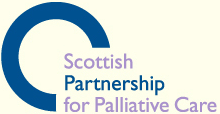- SPPC Achievements 2024-25
- Annual Conference 2025: From System Holes to Whole System
- Call for Posters
- Assisted Dying Bill - Perspectives Informed by Palliative Care
- SPPC’s response to the public consultation on the SG Strategy for Palliative Care
Poster abstracts of the month - April
Poster abstracts of the month - April
The SPPC Annual Conference in 2016 featured 36 poster displays, sharing work and research underway across Scotland. Each month, this blog focuses on the content of a few of these posters. This month, we focus on:
- Electronic key information summaries allow timely documentation of patients’ wishes out of hours
- End of life care in the digital age
- Evaluation of an Anticipatory Care planning tool for care home residents and their families
- Gleniffer Outreach Information & Support Centre as a Palliative Care Community Resource
- HHeLP - Highland Hospice Electronically Linking People in the Highlands
|
Electronic key information summaries allow timely documentation of patients’ wishes out of hours |
|
|
Author(s) |
Finucane A, Hall C, Leiva A, Lunan C, McCutcheon H, McLoughlin P, Murray S, Rhee J, Spiller J, and Tapsfield J |
|
Introduction: Electronic Key Information Summaries (KIS) are shared electronic patient records widely used throughout Scotland (Tapsfield et al. 2016). These allow selected parts of the GP patient record to be routinely shared with healthcare professionals across settings. The KIS may contain vital information to support out of hours palliative care decision-making, such as patient preferences for place of care, DNAPCR status and anticipatory medicines. Aim: To identify when different information pertinent to out-of-hours palliative care decision-making was serially recorded within the KIS for patients who died with cancer, organ failure or frailty and/or dementia. Method: A retrospective review of the primary care notes of deceased patients across nine general practices in Lothian was conducted in 2014. Results: We analysed 605 patient notes. A KIS was shared for patients with organ failure 22 weeks before death (Mdn=22, IQR=10-31), and for those with frailty and/or dementia, 20 weeks before death (Mdn=20, IQR=8-34). For patients with cancer, KIS’s were commenced later (Mdn=14, IQR= 6-27). Information on anticipatory medicines was shared two weeks before death (Mdn=2, IQR=1-6). Conclusion: Electronic key information summaries facilitate the timely documentation and sharing of patient information that is vital to support out of hours decision-making and prevent inappropriate hospital admissions. |
|
|
Author(s) |
Jayne E |
|
Outline of Sue Ryder's Online Community and Support for people who are dying, their families and people who are bereaved: ž the need for such a 24/7 support (current lack of consistent co-ordinated support and advice overnight and at weekends) ž why it was established (to meet this unfulfilled need and extend Sue Ryder's services beyond physical locations of palliative services) ž how it works (community for people receiving end of life care, their families and people who have been bereaved to share experiences and provide peer-to-peer support, supported by bereavement counsellors; an advice section on practical issues such as will-writing through to coping when someone is dying) ž what impact it has had on people's lives in its first year (figures on users, qualitative feedback) ž relevance to Health and Social Care Partnerships (new responsibility for provision of palliative care could include services like this or signpost to services like this). |
|
|
Evaluation of an Anticipatory Care planning tool for care home residents and their families |
|
|
Author(s) |
Boyd K, Gardner H, Highet G, Hockley J, MacKay A and McCutcheon H |
|
The poster describes the methodology findings and conclusion of a primary care quality improvement project which evaluated the efficacy and acceptability of a tool (ACQ) being used to facilitate anticipatory care planning in two contrasting care homes in Edinburgh. An audit of acute clinical events was combined with an interview study involving 27 relatives, care home staff, and local GPs. Interviews were recorded, transcribed and analysed thematically. A focus group of 30 out-of-hours GPs discussed linked case vignettes. The project found that clear plans, recorded electronically and informed by the ACQ, ensured most acute clinical events were handled appropriately. The system was most vulnerable when protocol driven decisions were made by out of hours NHS services. The study concluded that anticipatory care planning should start before care home admission and be a coordinated, ongoing care process tailored to individual needs and embedded in the routine procedures of care homes. Further work to develop family and staff information using a patient public involvement approach is now underway. |
|
|
Gleniffer Outreach Information and Support Centre as a Palliative Care Community Resource |
|
|
Author(s) |
Crawford A and Simpson H |
|
Gleniffer Outreach Information and Support Centre is a Palliative Care Community Resource. Our current Gleniffer Outreach facility relocated and opened in 2012 within the grounds of the Royal Alexandra Hospital in Paisley, a location that has proven significantly beneficial. Our aim was to provide a facility where patients, carers, Health / Social professionals and the general public could drop in or telephone for advice, guidance or be signposted to more suited services relating to any aspect of malignant or non-malignant palliative care need(s). The centre also provides an alternative location to the hospice, as it was reported that some individuals had difficulty with attending / returning to our hospice, especially for post bereavement support and counselling. Initially we did not know that we were developing a public health approach to palliative care. However this transpired by encouraging a compassionate and resilient community approach, increasing public awareness around death and dying, offering practical support, networking with other local services, whilst furthering volunteer involvement. |
|
|
HHeLP - Highland Hospice Electronically Linking People (in the Highlands) |
|
|
Author(s) |
Greenhalgh J, Keen J and Ravi G |
|
Background: The Inverness based Highland Hospice, provides a 10 bed in-patient service, Day Therapy service, telephone advice for HCPs, outpatients, domiciliary visits and a Bereavement Counselling Service to adults with advancing life-limiting disease living in the NHS Highlands area. The number of patients supported is the equivalent of 18% of the 2,500 people in this catchment area who die every year. HHeLP could quadruple the reach of current support. Method: People are recruited from contact through any of the Hospice services and the primary care team is informed - as Virtual Hospice aims to complement existing care of primary care teams giving greater confidence to patients and carers in their ability to cope at home. Individualised/prescribed resources are uploaded onto the portal and patient and carer are shown how to access and use. The portal enables secure messaging accessible by the team around the clock. Recruitment: The pilot has recruited approximately 20 users from across Highlands. Results: Early results have highlighted some interesting learning points Recommendations: ž Increase range of resources ž Introduce carers to the system with resources to help them in their caring role. ž Training of volunteers to give IT support locally to patients/carers who struggle with the electronic access. |
|


